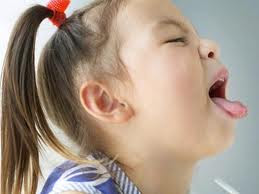Whooping cough
Definition :
 Whooping cough (pertussis) is a highly contagious respiratory tract
infection. In many people, it's marked by a severe hacking cough
followed by a high-pitched intake of breath that sounds like "whoop."
Whooping cough (pertussis) is a highly contagious respiratory tract
infection. In many people, it's marked by a severe hacking cough
followed by a high-pitched intake of breath that sounds like "whoop."
Before the vaccine was developed, whooping cough was considered a childhood disease. Now whooping cough primarily affects children too young to have completed the full course of vaccinations and teenagers and adults whose immunity has faded.
Deaths associated with whooping cough are rare but most commonly occur in infants. That's why it's so important for pregnant women — and other people who will have close contact with an infant — to be vaccinated against whooping cough.
Symptoms:
Once you become infected with whooping cough, it can take one to three weeks for signs and symptoms to appear. They're usually mild at first and resemble those of a common cold:
When to see a doctor
Call your doctor if prolonged coughing spells cause you or your child to:
Whooping cough is caused by bacteria. When an infected person coughs or sneezes, tiny germ-laden droplets are sprayed into the air and breathed into the lungs of anyone who happens to be nearby.
Complications:
Most people recover from whooping cough with no problems. When complications occur, they tend to be side effects of the strenuous coughing, such as:
In infants — especially those under 6 months of age — complications from whooping cough are more severe and may include:
Treatments and drugs:
Infants are typically hospitalized for treatment because whooping cough is more dangerous for that age group. If your child can't keep down liquids or food, intravenous fluids may be necessary. Your child will also be isolated from others to prevent the infection from spreading.
Treatment for older children and adults usually can be managed at home.
Medications
Antibiotics kill the bacteria causing whooping cough and help speed recovery. Family members may be given preventive antibiotics. Unfortunately, not much is available to relieve the cough. Over-the-counter cough medicines, for instance, have little effect on whooping cough and are discouraged.
Definition :
 Whooping cough (pertussis) is a highly contagious respiratory tract
infection. In many people, it's marked by a severe hacking cough
followed by a high-pitched intake of breath that sounds like "whoop."
Whooping cough (pertussis) is a highly contagious respiratory tract
infection. In many people, it's marked by a severe hacking cough
followed by a high-pitched intake of breath that sounds like "whoop."Before the vaccine was developed, whooping cough was considered a childhood disease. Now whooping cough primarily affects children too young to have completed the full course of vaccinations and teenagers and adults whose immunity has faded.
Deaths associated with whooping cough are rare but most commonly occur in infants. That's why it's so important for pregnant women — and other people who will have close contact with an infant — to be vaccinated against whooping cough.
Symptoms:
Once you become infected with whooping cough, it can take one to three weeks for signs and symptoms to appear. They're usually mild at first and resemble those of a common cold:
- Runny nose
- Nasal congestion
- Sneezing
- Red, watery eyes
- A mild fever
- Dry cough
- Provoke vomiting
- Result in a red or blue face
- Cause extreme fatigue
- End with a high-pitched "whoop" sound during the next breath of air
When to see a doctor
Call your doctor if prolonged coughing spells cause you or your child to:
- Vomit
- Turn red or blue
- Inhale with a whooping sound
Whooping cough is caused by bacteria. When an infected person coughs or sneezes, tiny germ-laden droplets are sprayed into the air and breathed into the lungs of anyone who happens to be nearby.
Complications:
Most people recover from whooping cough with no problems. When complications occur, they tend to be side effects of the strenuous coughing, such as:
- Bruised or cracked ribs
- Abdominal hernias
- Broken blood vessels in the skin or the whites of your eyes
In infants — especially those under 6 months of age — complications from whooping cough are more severe and may include:
- Ear infections
- Pneumonia
- Slowed or stopped breathing
- Dehydration
- Seizures
- Brain damage
Treatments and drugs:
Infants are typically hospitalized for treatment because whooping cough is more dangerous for that age group. If your child can't keep down liquids or food, intravenous fluids may be necessary. Your child will also be isolated from others to prevent the infection from spreading.
Treatment for older children and adults usually can be managed at home.
Medications
Antibiotics kill the bacteria causing whooping cough and help speed recovery. Family members may be given preventive antibiotics. Unfortunately, not much is available to relieve the cough. Over-the-counter cough medicines, for instance, have little effect on whooping cough and are discouraged.










0 komentar:
Posting Komentar